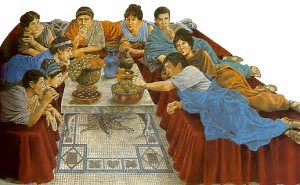The expression "bosom of Abraham", חיק אברהם, is post OT, and appears once in rabbinic literature, in the Babylonian tractate Kiddushin (marriages) page 72b, first line. My translation is:
The day that [Rabbi Ada bar Ahava] sat in the bosom of Abraham, Rabbi Yehuda was born in Babylon.
Here the phrase is a euphemism for "died", nothing more.
This is the first sentence in a breita that lists pairs of great Rabbis, one of who dies on the day that the other was born. The last line of the breita is:
... which shows that a righteous man does not leave this world until another man, destined to be as righteous as he, is created.
The phrase is alluded to in 4 Maccabees 13:17 (NRSA):
For if we so die, Abraham and Isaac and Jacob will welcome us, and all the fathers will praise us.
This usage shows the Jewish folk belief that the righteous are welcomed in the afterlife by the Fathers of the nation. This theme is common in the Midrashic literature but it was never the basis of Jewish doctrine. In fact, the concepts of the afterlife, העולם הבא, the messianic times, ימות המשיח, and the Garden of Eden, גן עדן, were never and aren't now clearly defined in Jewish doctrine, and are commonly conflated in various ways. Some, but not all versions of the "El malei rahamim" prayer said today at funerals and remembrance events includes the words "... may [he/her/they] rest in the Garden of Eden".
These ideas commonly have little importance in Jewish life. They are held in reserve and are revived in Jewish circles in dire times, such as the times of the Maccabbeean revolt, and the great revolts of the first and second centuries.
Note that the word commonly translated as "bosom", a kind of funky English word that can also refer to a woman's chest in English but not in Hebrew, is חיק in Hebrew, which might better be translated into English nowadays as "embrace". It is used in Hebrew to indicate closeness, membership in an intimate circle or group, or acceptance.
I speculate that the phrase "bosom of Abraham" fell out of use in Jewish circles because of it's adoption in Christian circles. It does not appear in later Jewish literature or liturgy. There is a gloss on the expression in the Jewish Encyclopedia.
So, to answer your question, my understanding of John 1:18 is that the intent of the verse is intended to contrast with the phrase "bosom of Abraham" (into which many people are accepted), to the "bosom of the Father", into which only Jesus was accepted, and therefore only Jesus has seen God, as opposed to Moses, who saw only the back side of God from the niche in the rock on mount Sinai (Exodus 33:22).

